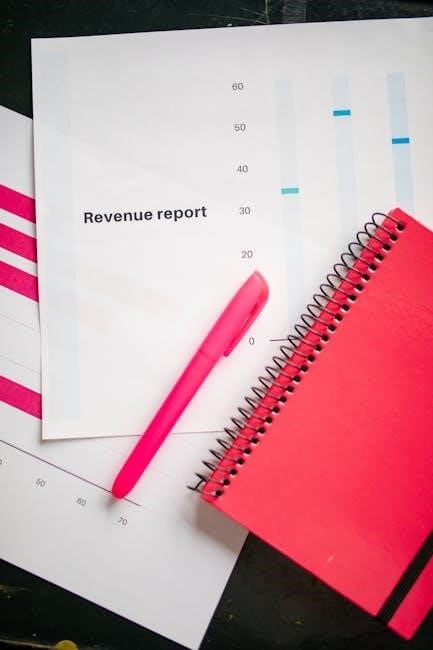This comprehensive guide provides detailed insights into the CMA certification, covering exam structure, content, and preparation strategies. It includes proven techniques and resources to help candidates succeed.
Overview of the CMA Certification
The Certified Management Accountant (CMA) certification is a prestigious credential offered by the Institute of Management Accountants (IMA), recognizing expertise in management accounting and financial management. It is designed for professionals seeking to advance their careers in finance, particularly in strategic planning, budgeting, and financial decision-making. The certification validates skills in financial reporting, performance analytics, and strategic financial management. To earn the CMA, candidates must pass a rigorous two-part exam and meet specific educational and work experience requirements. This certification is highly regarded globally, demonstrating a commitment to professional excellence and ethical standards in the field of management accounting.
Importance of a Comprehensive Study Guide
A comprehensive study guide is essential for success in the CMA exam, providing structured learning materials tailored to the exam syllabus. It offers in-depth explanations of key topics, practical examples, and practice questions, helping candidates build a strong foundation in financial planning, performance analytics, and strategic financial management. The guide also highlights critical areas of focus, ensuring efficient study time and improved retention. By using a well-organized study guide, candidates can systematically approach each section of the exam, identify knowledge gaps, and refine their problem-solving skills. This resource is particularly valuable for self-study learners, offering a clear roadmap to mastering the exam content and achieving certification.
CMA Exam Structure and Content
The CMA exam consists of two parts, covering financial planning, performance analytics, and strategic financial management. It evaluates expertise in financial decision-making, budgeting, and corporate finance strategies.
Part 1: Financial Planning, Performance, and Analytics
Part 1 of the CMA exam focuses on financial planning, performance metrics, and analytics. Candidates must demonstrate skills in budgeting, forecasting, and financial reporting; Topics include variance analysis, cost management, and KPIs. The section emphasizes data-driven decision-making and strategic financial insights. Effective study materials, such as the official IMA guides and supplementary resources, are essential for mastering these concepts. Practice exams and mock tests are recommended to ensure readiness. This part lays the foundation for advanced financial management in Part 2.

Part 2: Strategic Financial Management
Part 2 of the CMA exam delves into strategic financial management, focusing on long-term decision-making and organizational growth. Key topics include corporate finance, risk management, and investment decisions. Candidates must understand capital budgeting, mergers and acquisitions, and ethical considerations in financial strategies. The section also covers advanced financial reporting and internal controls. To excel, studying official IMA materials and supplementary resources is crucial. Practice exams and case studies help refine analytical and strategic thinking skills; This part emphasizes the application of financial knowledge to drive business success and sustainability, preparing professionals for leadership roles in financial management.
Eligibility Criteria for the CMA Exam
The CMA exam requires a bachelor’s degree in a related field, relevant work experience in finance, and professional membership with IMA. Additional requirements ensure candidates are well-prepared.
Educational Requirements
To qualify for the CMA exam, candidates must hold a bachelor’s degree in accounting, finance, or a related field. Some individuals with non-related degrees may still be eligible if their coursework includes relevant subjects like financial accounting, managerial accounting, or business law. Additionally, candidates are typically required to complete a minimum number of semester hours in specific business and accounting courses. The Institute of Management Accountants (IMA) does not specify a particular GPA requirement but emphasizes the importance of academic preparation in finance and accounting. Meeting these educational prerequisites ensures candidates have a solid foundation to succeed in the exam and their future roles as management accountants.
Work Experience Requirements
Candidates for the CMA certification must meet specific work experience requirements, typically two years of professional experience in management accounting or a related field. This experience should demonstrate practical skills in areas such as budgeting, forecasting, financial analysis, and decision-making. The work experience does not necessarily need to be gained after completing a bachelor’s degree; it can also be accumulated during or before studies. However, the experience must be relevant and directly related to management accounting or financial management. Candidates with experience in public or private sectors, or in multinational organizations, may find their background particularly aligned with the CMA exam’s focus areas. This requirement ensures that certified professionals possess both theoretical knowledge and hands-on expertise.

Best Study Materials for CMA Preparation
The best CMA study materials include official IMA resources and supplementary tools, ensuring comprehensive coverage of exam topics and practical applications.
Official IMA Study Materials
The official IMA study materials are the most trusted resources for CMA preparation, offering comprehensive coverage of exam topics. These materials include detailed textbooks, practice questions, and online tools designed to align perfectly with the exam content. They are regularly updated to reflect the latest advancements in management accounting and financial management; Candidates benefit from structured learning, with clear explanations and practical examples. The IMA also provides access to interactive platforms, enhancing the study experience. These materials are considered essential for understanding complex concepts and ensuring readiness for the rigorous exam. They are widely recommended by CMA professionals and educators, making them a cornerstone of effective preparation.
Supplementary Resources and Tools
Beyond official materials, supplementary resources like third-party study guides, online forums, and video tutorials can enhance CMA preparation. Websites and platforms offer additional practice questions, interactive simulations, and expert insights. These tools often provide alternative explanations for complex topics, aiding deeper understanding. For example, third-party study guides like those from Gleim or Wiley offer structured approaches and mock exams. Online communities, such as Reddit forums or specialized CMA groups, allow candidates to share tips and experiences. Additionally, video tutorials and webinars can simplify difficult concepts through visual and auditory learning. These resources complement official materials, offering diverse perspectives and practical applications, thereby enriching the study process and improving exam readiness.
Effective Study Strategies for Passing the CMA Exam
Utilizing structured schedules, active learning techniques, and regular practice exams can significantly enhance preparation. Prioritize weak areas and maintain consistent study habits to ensure comprehensive understanding and retention.
Time Management and Study Schedules
Effective time management is crucial for CMA exam success. Create a structured study schedule, allocating specific hours to each topic based on exam weightage. Start early, allowing ample time for revision. Dedicate consistent daily study sessions, ensuring regular breaks to maintain focus. Prioritize challenging areas and track progress. Utilize tools like calendars or apps to stay organized. Incorporate practice exams and mock tests to simulate real exam conditions. Regularly review and adjust your schedule to accommodate weaknesses and strengths. Consistency and adaptability are key to mastering the vast syllabus within the allotted timeframe. A well-planned schedule ensures comprehensive preparation and reduces exam stress.

Practice Exams and Mock Tests
Practice exams and mock tests are essential for CMA exam preparation. They simulate real exam conditions, helping candidates familiarize themselves with the format, timing, and question types. Regular practice identifies weak areas, allowing focused improvement. These tools enhance problem-solving skills and time management under pressure. Many resources, such as official IMA materials and supplementary guides, offer practice exams. Mock tests also provide detailed feedback, highlighting strengths and gaps in knowledge. Consistent practice builds confidence and reduces exam anxiety. Utilizing these resources ensures a thorough understanding of the syllabus and improves readiness for the actual exam. They are a cornerstone of effective CMA preparation strategies.

Professional Benefits of Becoming a CMA
Becoming a CMA enhances credibility, demonstrates expertise in financial management, and opens global career opportunities. It boosts professional stature, enabling accountants to contribute strategically to organizational success and growth.

Career Advancement Opportunities
Obtaining the CMA certification significantly enhances career prospects, enabling professionals to transition into senior roles like Financial Analyst, Management Accountant, and Financial Manager. It equips individuals to excel in industries such as manufacturing, healthcare, and public sectors. The certification demonstrates expertise in strategic financial management, making CMAs highly sought after for leadership positions. Additionally, it opens doors to global opportunities, as the CMA is recognized worldwide. With a CMA designation, professionals can expect increased job security, higher salary potential, and greater influence in organizational decision-making. This certification is a powerful tool for advancing careers in finance and management, ensuring long-term professional growth and success.
Enhanced Earning Potential
Attaining the CMA certification significantly boosts earning potential, with certified professionals earning up to 62% more than their non-certified counterparts. On average, CMAs can expect salaries ranging from $85,000 to over $150,000 annually, depending on experience and location. This certification is recognized globally, making CMA holders highly competitive in the job market. Employers often associate the CMA designation with advanced skills in financial management, strategic decision-making, and performance analytics, leading to higher compensation packages. The investment in studying for and obtaining the CMA certification is frequently offset by substantial salary increases, ensuring long-term financial benefits for professionals in the field of management accounting;

Maintaining the CMA Certification
Maintaining the CMA certification requires completing 30 hours of CPE annually, adhering to ethical standards, and remaining a member of IMA. Stay updated with industry trends.
Continuing Professional Education (CPE)
Continuing Professional Education (CPE) is essential for maintaining the CMA certification. Professionals must complete 30 hours of CPE annually, with at least 50% focused on advanced or technical topics. CPE ensures CMAs stay updated on industry trends, ethical standards, and professional developments. Courses can be completed through online platforms, workshops, or conferences. Topics may include financial management, analytics, and leadership skills. CPE requirements demonstrate a commitment to lifelong learning and adaptability in the ever-evolving finance landscape. By fulfilling CPE obligations, CMAs uphold the highest standards of expertise and professionalism, enhancing their value to organizations and advancing their careers. Regular compliance is mandatory for certification renewal.
Professional Membership and Networking
Active participation in professional organizations, such as the Institute of Management Accountants (IMA), is crucial for CMAs to maintain certification and advance their careers. Membership offers access to exclusive resources, including webinars, workshops, and networking events. Connecting with fellow professionals fosters collaboration, mentorship, and knowledge sharing. Regular engagement with industry leaders and peers helps CMAs stay informed about trends and best practices. Additionally, networking opportunities through regional chapters and virtual platforms enhance career growth and professional development. By staying involved in the professional community, CMAs can leverage these connections to expand their expertise and contribute to the field of management accounting. This engagement is vital for long-term success and industry influence.
